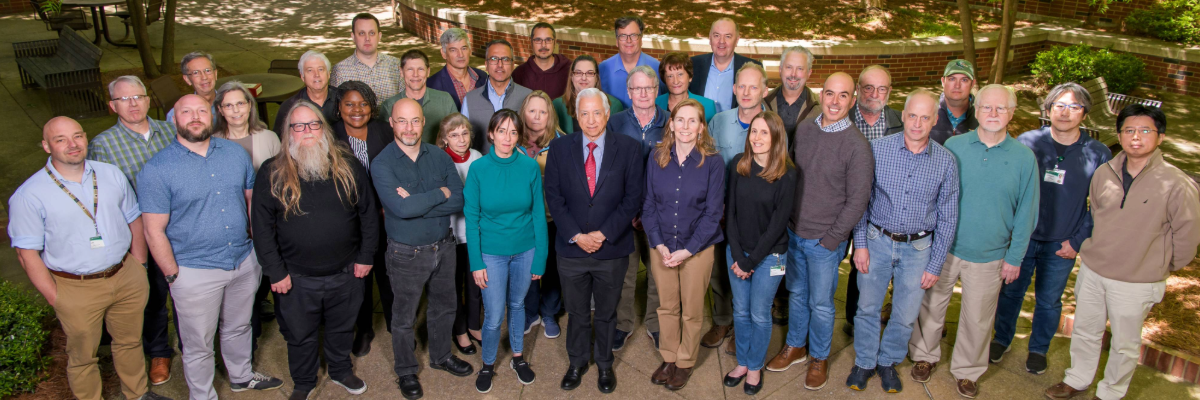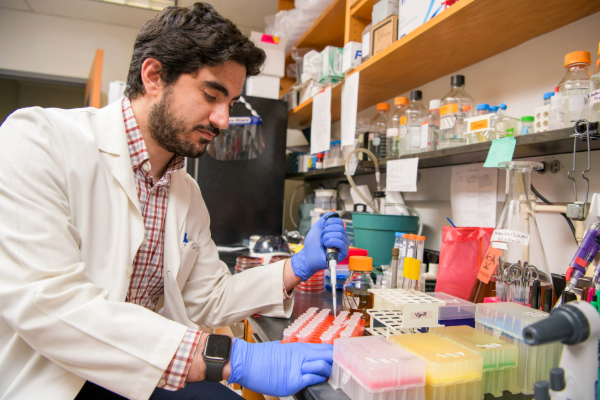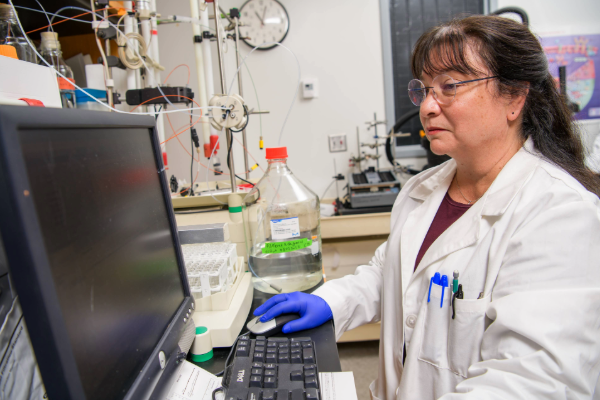
Our Mission
Our mission is to be innovative leaders in the study of microbiology, infectious diseases, and immunology. We will lead by example with a strong commitment to service, education, research, professional growth, and institutional service. We will emphasize the value of personal honesty and accountability and strive to maintain meaningful personal and professional interactions with students, trainees, administrators, and faculty. We will endeavor to facilitate career development and to create opportunities for advancement and for retention.
Our Vision
Our vision for the department is to maintain and further enhance its premier status in the fields of microbiology, immunology, and virology by 1) providing innovative scientific training, 2) pursuing state-of-the-art research, 3) making a significant commitment to teaching, 4) facilitating the growth of extramural funding and 5) creating a respectful and collaborative environment that supports the success of all community members. We will champion and support innovation in all aspects of research, education, and administration. Finally, we will help create an environment that also fosters synergy between clinical and basic research and that recognizes the important contributions that teaching faculty make to the department and the institution.
Our Department
 The Department of Microbiology was established in 1945 and, up until 1954, consisted of three faculty members whose research was limited to anti-infectives. With the recruitment of immunologists including Dr. R. Hiramoto in 1966, the research focus of the department expanded to encompass both microbiology and immunology. Further recruitments, including Drs. J. Mestecky (1969), J. McGhee (1972) and S. Michalek (1979) led to the development of cutting edge programs in mucosal immunology that continue within the department and on the UAB campus to this day. The first PhD conferred at UAB was given in 1969 to Dr. R. Acton. R. Acton a graduate student in the Department of Microbiology and later faculty member. Since 1991, almost 300 students have been awarded PhD degrees in Microbiology.
The Department of Microbiology was established in 1945 and, up until 1954, consisted of three faculty members whose research was limited to anti-infectives. With the recruitment of immunologists including Dr. R. Hiramoto in 1966, the research focus of the department expanded to encompass both microbiology and immunology. Further recruitments, including Drs. J. Mestecky (1969), J. McGhee (1972) and S. Michalek (1979) led to the development of cutting edge programs in mucosal immunology that continue within the department and on the UAB campus to this day. The first PhD conferred at UAB was given in 1969 to Dr. R. Acton. R. Acton a graduate student in the Department of Microbiology and later faculty member. Since 1991, almost 300 students have been awarded PhD degrees in Microbiology.
The Department of Microbiology continued to grow throughout the next 30 years under the leadership of Dr. J.C. Bennett (later the President of UAB), Dr. K. Roozen, Dr. G. Cassell, Dr. S. Michalek and Dr. D. Chaplin. During those years, the department built world-class programs in immunology, cancer biology, structural biology and biophysics, virology, microbial pathogenesis and genetics. For many years the UAB Department of Microbiology held the number 1 ranking of all microbiology departments in the US for the largest number of NIH research, merit and training grants.
 Today the UAB Department of Microbiology is still consistently ranked among the best microbiology departments in the country and as of 2023 is No. 12 according to the Blue Ridge Institute for Medical Research for NIH funding. We are a vibrant highly collaborative research community consisting of nearly 200 individuals, made up of primary faculty and instructors, our secondary and adjunct faculty, graduate students, and post-doctoral fellows and our trained technicians. Department faculty, students and post-doctoral fellows publish nearly 100 peer-reviewed manuscripts annually.
Today the UAB Department of Microbiology is still consistently ranked among the best microbiology departments in the country and as of 2023 is No. 12 according to the Blue Ridge Institute for Medical Research for NIH funding. We are a vibrant highly collaborative research community consisting of nearly 200 individuals, made up of primary faculty and instructors, our secondary and adjunct faculty, graduate students, and post-doctoral fellows and our trained technicians. Department faculty, students and post-doctoral fellows publish nearly 100 peer-reviewed manuscripts annually.
Faculty members serve on national advisory, foundation and journal editorial boards. They serve as journal editors and as members and chairs of NIH and foundation study sections. They are involved in the education mission of UAB and the Heersink School of Medicine and act as graduate theme directors and co-directors. Department of Microbiology faculty participate in teaching classes to undergraduate, graduate and medical students and serve as the organizers and course directors for a number of the graduate level classes. In 2017, the AMC21 Scholar Program was implemented to attract the top graduate student applicants to UAB and provides up to 8 awards per year to recruit the top candidates to the GBS. A new interdisciplinary program (Undergraduate Immunology Program) between the Department of Microbiology in the Heersink School of Medicine and the Department of Biology in the College of Arts and Sciences was established in response to the growing interest in immunology among our undergraduate students. Department of Microbiology faculty are members and leaders of university and school-wide institutes and centers, including the Immunology Institute, the O'Neal Comprehensive Cancer Center, the Center for Clinical and Translational Science and the Center for AIDS Research. Thus, the faculty and the department actively serve the university mission of excellence in research, service and teaching.
It is an exciting time to be a scientist at UAB and in the Department of Microbiology. J. Victor Garcia-Martinez, a virologist, became department chair in August 2023. With our existing cadre of investigators and the new faculty who recently joined us, we plan to capitalize on the department’s strong foundation and heritage to build a scientifically rich environment. This will allow us to meet our twin missions of carrying out cutting-edge, fundamental basic and translational research to improve human health and educating the next generation of scientists who will lead the fight against infectious and immune-mediated diseases.